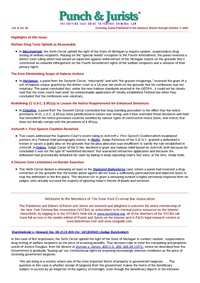In this case, the defendant appealed his conviction for cocaine conspiracy, arguing that the Government violated the Speedy Trial Clause of the Sixth Amendment by waiting over five years to execute the warrant for his arrest.
The Fifth Circuit agreed, concluding that the district court had failed to weigh …
Here the Court held that the Government is not required to prove that defendants intended to use minor to shield themselves in order to apply two-level enhancement for using a minor to commit a crime, under USSG § 3B1.4.
Six defendants in this case were convicted of a …
In 1996, as part of the Antiterrorism and Effective Death Penalty Act (AEDPA), Congress enacted a series of far-reaching changes in the rules governing habeas corpus litigation; and already those changes have drastically reduced the number of habeas cases. The impact of some of the changes (such as the …
One of the many issues addressed in this appeal was a question long regarded as firmly settled under Seventh Circuit precedent - namely, whether the sentence of one of the defendants in this case could properly be enhanced to a life sentence based on her prior convictions after the …
Here the Court granted a motion to suppress evidence on the grounds that the border patrol agent who stopped the defendant's truck had nothing but an "inchoate and unparticularized suspicion or hunch" arising out of a series of innocuous events.
In this case, after defendant was stopped at …
In this case the petitioner sought review of a decision by the district court which denied his application for habeas corpus relief, rejecting petitioner's contention that the Supreme Court's decision in Campbell v. Louisiana, 523 U.S. 392 (1998) announced a new rule of constitutional criminal procedure and that the …
In this case, the plaintiff, an inmate in a Federal prison, slipped and fell on a wet floor in the prison's kitchen, where he was working, while he was a pretrial detainee. The inmate sued defendant United States under the Federal Tort Claims Act. The District Court dismissed the …
U.S. v. Reilly, No. 01 Cr. 1114 (S.D.N.Y. 10/11/2002) (Judge Patterson)
U.S. v. Oakes, 224 F.Supp.2d 296 (D.Me. 2002) (Judge Carter)
The common theme in both of these decisions was the Supreme Court’s recent ruling in Ashcroft v. Free Speech Coalition, 122 S.Ct. 1389 (2002), which struck down two …
Here the Court held that a civil suit to compel state officials to release biological evidence for DNA testing was in effect a challenge to the validity of the defendant’s murder conviction and thus was properly dismissed as a successive habeas petition.
In this case the district court …
In this case the Court considered the appeal of a defendant who had pled guilty to misprision of felony pursuant to a written agreement with the government. According to the terms of the agreement, if the defendant provided substantial assistance to authorities regarding additional investigations, the government " 'would …
In this case of first impression, the Sixth Circuit upheld the right of the State of Michigan to conduct random, suspicionless drug testing of welfare recipients as the price of receiving benefits. That decision calls to mind the compelling and prophetic words of Justice Douglas, from his dissent in …
U.S. v. Reilly, No. 01 Cr. 1114 (S.D.N.Y. 10/11/2002) (Judge Patterson)
U.S. v. Oakes, 224 F.Supp.2d 296 (D.Me. 2002) (Judge Carter)
The common theme in both of these decisions was the Supreme Court’s recent ruling in Ashcroft v. Free Speech Coalition, 122 S.Ct. 1389 (2002), which struck down two …
Although this case does not directly deal with persons who have been formally charged with crimes, it does deal with an offshoot of the growing web of criminal statutes that make it a crime for a parent to fail to pay child support. This decision is also noted for …
Here the Court granted the Government's motion, pursuant to 8 USC § 1451(e), to revoke the citizenship of a defendant convicted of naturalization fraud, even though more than five years had elapsed since her conviction.
The defendant in this case was convicted of naturalization fraud. More than five …
This case is noted principally for the intensity of the dissent’s emotional and highly vitriolic response to the decision of a majority of the Ninth Circuit judges not to grant an en banc rehearing of a prior decision reported at 285 F.32d 1117 (9th Cir. 2002). In that earlier …
Here the Court held that the Apprendi rule did not apply retroactively to cases on collateral appeal, and that even if it did, the defendant was procedurally barred from raising that claim in this case because he failed to raise the issue previously.
The defendant in this case …
